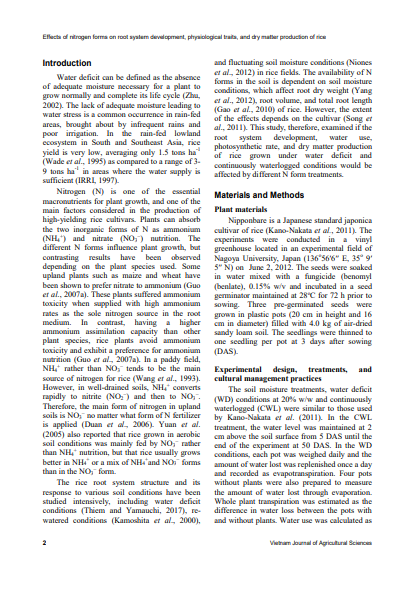Assessing the Status of Information Technology Applications to Accounting Work by SMEs in Hanoi: Implications for E-accounting
1Faculty of Accounting and Business Management, Vietnam National University of Agriculture, Hanoi 131000, Vietnam
Main Article Content
Abstract
Small and medium enterprises (SMEs), which make up over 90% of the total number of enterprises in Vietnam, play important roles in economic development not only in Hanoi but also in the whole country. As an effective tool in business management, accounting supplies important information for making decisions. Recently, information technology in business, especially in accounting work or e-accounting, has increased, and along with many advantages in terms of job productivity, has also been considered as the source of changing the roles of accountants in business. In order to show evidence of these changes as being the background for issuing solutions to improve information technology applications in accounting areas of enterprises, this study conducted a survey of 186 small and medium-sized enterprises in Hanoi. The research results showed that the lack of knowledge of current accounting staff is one of the two biggest obstacles to improving the application of information technology or developing e-accounting in accounting areas of small and medium-sized enterprises. Almost all the enterprises accepted the positive features of information technology for accounting work, however they still strongly considered the dynamics as well as the satisfaction of specific information technology products in their accounting work, especially in dealing with new business transactions.
Article Details
References
-
Abu-Musa A. A. (2005). The Determinates of Selecting Accounting Software: A Proposed Model. Review of Business Information Systems (RBIS). 9(3): 85-110. DOI: 10.19030/rbis.v9i3.4456.
Esmeray A. & Esmeray M. (2020). Digitalization in accounting through changing technology and accounting engineering as an adaptation proposal. Handbook of Research on Strategic Fit and Design in Business Ecosystems, IGI Global, pp. 354-376.
Fatima H. (2016). Impact of E-Accounting in Today’s Scenario. International Journal of Engineering and Management Research. 6(1): 260-264.
Ghaffar A. M., Mokhtar M. Z., Ismail W. N. S. W. & Othman M. R. (2019). Determinant of E-accounting (EA) adoption among Malaysian maritime SMES”. International Journal of Engineering and Technology. 8(18): 102-105.
Ha Thi Huong Lan (2019). Solutions for Vietnamese businesses in the Industrial Revolution 4.0. Electronic financial magazine. Retrieved from https://tapchitaichinh.vn/tai-chinh-kinh-doanh/giai-phap-cho-doanh-nghiep-viet-nam-trong-cuoc-cach-mang-cong-nghiep-40-302110.html on 24th February, 2022 (in Vietnamese).
Huynh Thi Huong (2015). Factors affecting the decision to choose accounting software of small and medium enterprises in Ho Chi Minh City. Master thesis in economics. Ho Chi Minh University of Economics (in Vietnamese).
ICAEW (2017). Understanding the impact of technology in audit and finance, pp.8-9. Retrieved from https://www.icaew.com/-/media/corporate/files/middle-east-hub/understanding-the-impact-of-technology-in-audit-and-finance.ashx on March 15, 2022.
Lina K & Edita G. (2015). The Effect of Information Technology on Accounting System’s Conformity with Business Environment: A Case Study In Banking Sector Company. Procedia Economics and Finance. 32: 1707-1712.
Lucas H. C. (2009). Information Technology for Management. A global Text Project by the Jacobs Foundation, Zurich, Switzerland. 752pp. Retrieved from http://www.bigbook.or.kr/bbs/data/file/bo01/1535291005_ujG29RvN_Information_Technology_for_Management_Henry_Lucas.pdf on 10th January, 2022.
Ly Lan Yen & Nguyen Thu Huyen (2020). Effective application of information technology in accounting work. Journal of Accounting and Auditing. 205 (10): 31-34 (in Vietnamese).
Ghasemi M., Shafeiepour V., Aslani M. & Barvayeh E. (2011). The impact of Information Technology (IT) on modern accounting systems. Procedia - Social and Behavioral Sciences. 28: 112-116.
Ministry of Information and Communications (2019). Proposal Project of National Digital Transformation. , 101pp. Retrieved from https://mic.gov.vn/Upload_Moi/DuThaoVanBan/PL03-DU-THAO-DE-AN-CHUYEN-DOI-SO-QG-VER-1.0.pdf on February 25, 2022 (in Vietnamese).
MPI - Ministry of Plan and Investment (2021). The investment plan. Vietnam business white paper in 2021. Statistical publishing house. Retrieved from https://www.gso.gov.vn/du-lieu-va-so-lieu-thong-ke/2021/08/sach-trang-doanh-nghiep-viet-nam-2021/ on November 30, 2021 (in Vietnamese).
Nguyen Hoang Nam (2021). Factors affecting the application of information technology in the accounting field in Vietnam. National Scientific Conference, CFACT2021: 253-270.
Nguyen Minh Ngoc (2011). Solutions to promote the application of information technology in the tax industry in Vietnam. Doctoral thesis. Retrieved from http://elb.lic.neu.edu.vn/bitstream/DL_123456789/7104/1/TT.LATS.981.PDF on January 20, 2022 (in Vietnamese).
Nguyen Tuan Anh (2019). Developing small and medium enterprises in Hanoi: difficulties and solutions. Business and Technology Magazine. April 2019 issue: 21-47 (in Vietnamese).
Phi Thi Diem Hong, Do Quang Giam & Lai Phuong Thao (2022). Advantages and Disadvantages of Applying Forensic Accounting in the Developing Countries: The Case in Vietnam. A chapter of Handbook of Research on the Significance of Forensic Accounting Technique in Corporate Governance: 62-84. DOI: 10.4018/978-1-7998-8754-6.ch004.
Søraker J. H. & Brey P. (2015). Information Technologies report. A part of the project Stakeholders Acting Together on the Ethical Impact Assessment of Research and Innovation - SATORI - which received funding from the European Commission’s Seventh Framework Programme (FP7/2007-2013) under grant agreement No. 612231. Retrieved from https://satoriproject.eu/media/2.b.1-Information-technology.pdf on February 21, 2022.
Toshniwal R. (2016). E-Accounting: The necessity of modern business. Research paper 4th International Conference on Science, Technology and Management, May 15, 2016. Retrieved from http://data.conferenceworld.in/ICSTM4/P579-583.pdf on January 8, 2022.
Thottoli M. M & Ahmed E. R. (2021). Information technology and E-accounting: some determinants among SMEs. Journal of Money and Business Emerald Publishing Limited. 2(1): 2634-2596. DOI 10.1108/JMB-05-2021-0018.
VCCI (2005). Handbook of Information and Communication Technology for Business. Report Project support by USaid and Vietnam Competitiveness Initiative (VNCI). Retrieved from itb.vn › uni › home › file_name=book_so-tay-cntt-ICT4B_Handbook on December 25, 2020 (in Vietnamese).
Vu Quoc Thong (2012). The influence of information technology (IT) on modern accounting information system. Scientific Journal of the Open University of Ho Chi Minh City. 7(2): 89-97 (in Vietnamese).
Vu Thi Tuyet Mai & Nguyen Thi Thu Ngan (2016). Research on the current situation of information technology application in accounting work in small and medium enterprises in Da Nang city. Posted in Proceedings of the CITA 2016 scientific conference “IT and Applications in various fields”: 285-289. Retrieved from http://thuvien.vku.udn.vn/bitstream/123456789/188/1/20181207185112.pdf on January 10, 2022.

